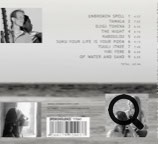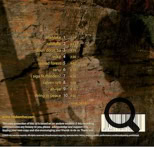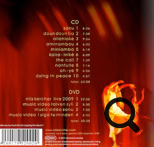MUSIC

Nils Kercher: vocals, guitars, acoustic bass, percussion, violin, balafon, music & arrangement
Kira Kaipainen (FIN): lyrics
Hale Heikkilä (FIN) cello
mixing: Kris Gorski / audioplanet (Poland)
matering: Radu Marinescu / acoustic entertainment / Cologne (DE)
Label: ancient pulse records LC: 20081
Distribution: BROKEN SILENCE
Nils Kercher CAN YOU SMELL THE RAIN (13th March 2020)
sound samples
A thrilling combination of sound, lyrics and a captivating urban groove
Songs that seem to be born right in the ear of the listener, then dissolve and disappear.
Can you smell the rain? Yes, definitely, you can. And can you name the unnameable? Why should you do that? The Bonn-based multi-instrumentalist and songwriter Nils Kercher has long since given up the search for handy terminology for his music. His creations are so rich in musical influences, cultural references, personal stories and profound ideas that even a string of terms could only cover part of the trace elements they contain. Let's therefore leave it at this point with the beautiful and all-encompassing term music.
Like his previous albums, the new CD "Can You Smell The Rain" was not created overnight. The reason for this is obvious when you get involved with Kercher's world. He roams through life with alert eyes and open ears and takes a stand with his songs. His albums are not collections of beautiful sounding platitudes, but every song is about something. The personal and the global always go hand in hand. Sometimes it reveals itself on first hearing, other times you have to let it sink to the bottom to get to it. Kercher himself is extremely unobtrusive. He has a lot to tell, but does not suffer from the Messiah complex of so many of his colleagues. "I don't have a mission and don't want to bring certain messages into the world. I sing songs about things that intrigue or bother me."
The thoughtful, very poetic and in detail sometimes provocative lyrics don't originate from Kercher himself, but from his partner Kira Kaipainen. They are usually written independently of the songwriter's compositions, but the intentions of the two companions merge so congenially that the musician only has to reach into his home drawer to find exactly the lyrics he was looking for anyway. The combination of sound, lyrics and a captivating urban groove takes the listener by the hand on a journey. But beware of false expectations. Whoever equates the word journey prematurely with holiday and transfiguration is on the wrong track here. "Can You Smell The Rain" is not a cozy trip in an air-conditioned all-inclusive bus, but Kercher and Kaipainen confront the looking ear with the hot spots and problem zones of the outer world until they grant it access to the depths of their inner worlds.
So far, Nils Kercher has made a name for himself primarily as a Kora player and world music pioneer. The Kora is an ancient West African stringed instrument that could be described casually as a mixture of harp and lute. It is difficult to come to terms with the instrument's variety of sounds, but anyone who hears its clear, filigree, flowing and dripping sound only once will recognize it in any ensemble, no matter how large. But Kercher describes his new CD as a re-encounter with the guitar. The songs were mainly written on the six string, the other instruments, including violins and of course the kora, were added during the formation of the songs. It's hard for Kercher to pinpoint the reason for his choice, and yet he finds such poetic words for it as if it were lyrics for a new song. "It's like standing in front of your wardrobe in the morning looking for the right clothes for the day. You just know what fits and what doesn't. That's not a rational decision, but within I hear how it has to be."
Above all these conceptual and instrumental components we find the vocals. Kercher manages to create new facets for his voice in every song. Sometimes chatting pensive, at other times expressively summoning up to the choir, here working with the stylistic means of the present, there letting himself fall into the realms of tradition, rhythmically accentuating or creating melodic arcs, he always finds surprising stylistic means to lend each song the character of an individually told story.
Thus Kercher succeeds in a fascinating way not to allocate his songs to a specific place in space and time, but to de-locate them. The album seems like a house with many doors, and it's up to each listener to decide which stylistic doorbell he wants to choose. Kercher's Kora playing is so organically interspersed with influences from his everyday life in Europe that it sounds completely different from anything known from this instrument in Africa. Kercher has already pursued the intention of de-localisation on his previous albums, but through the prominent use of the guitar he is able to realise this ideal even more convincingly on "Can You Smell The Rain". Although he internalises and respects different traditions, he doesn't feel exclusively committed to any of them.
Without question, he is interested in his personal language, which he can carry wherever he is. "This is always an incessant listening that begins in nothingness, and the willingness to bear the unknown."
The Neue Westfälische Zeitung states that Nils Kercher has a "gentle but irresistible power". It can hardly be expressed more aptly. His songs seem to be born right in the ear of the listener, then dissolve and disappear. And so the title of his album is being fulfilled like a prophecy. In fact, you sometimes think you can smell the songs on "Can You Smell The Rain" rather than hear them.

Nils Kercher: lead & backing vocals, guitars, acoustic bass, kora, balafon, percussion, violin
Vincent „Themba“ Goritzki: e-guiar, acoustic guitars, e-bass, double bass
Kris Górski: piano
Label: ancient pulse records LC: 20081
Distribution: BROKEN SILENCE
Nils Kercher SUKU - YOUR LIFE IS YOUR POEM (2016)
"...wonderful new album...great tracks brimming with kora and fantastic vocals” BBC / UK
A sound painter, a storyteller, a seeker of myths. Nils Kercher is all of these. On his third album SUKU we hear the highly versatile musician amidst his band as a proficient kora and balafon player, as an imaginative master of percussion, and as an expressive singer with a broad-ranging repertoire of timbres. Powerful Afro rhythms, swinging balafons and minimalist string-playing form a series of fantastic contrasts while later passing into an almost sacred sound space with a quietly oscillating pulse. His partnership with Kira Kaipainen continues to be a central element. Her soft voice and her lyrics accompany Kercher on a journey of sound that still draws its nourishment from its West African roots while constantly seeking out new paths of its own and at the same time embracing the vast Nordic landscapes. Martinique singer Sylvia Laubé blends in perfectly with Kira´s Scandinavian tone colour to create the harmonious and rich choirs the listener finds throughout the album. Kercher has also invited the Senegalese singer Mariama Kouyaté to perform the song „Yiri Fere“ as a duet. Her exquisite voice flowers beautifully in this moving composition. The ngoni virtuoso Barou Kouyat é brings an earthy colour to the musical texture. In addition, his acoustic guitar accentuates Kercher´s melodic kora playing with great sensitivity. The two artists, who come from very different backgrounds, share a natural and organic musical dialogue, which attests to their extraordinary flexibility and poise. Alongside the dialects Soussou and Malinke, spoken in Guinea, the album also features lyrics in Bambara, the chief language of Mali and includes tunes written in English and Finnish. The nine songs feel like a cycle of verses that can leave you enchanted long after the music has faded away. Kercher´s achievement is to successfully merge the lyrical, refined aspect of his compositions with his passion for rhythm and energy. The way these two opposites always manage to regain their balance is what makes listening to SUKU such a fantastic experience.

Nils Kercher: lead & backing vocals, kora, balafon, percussion, bolong
Oumar Barou Kouyaté (Mali): ngoni / acoustic guitar
Kira Kaipainen (Finland): backing vocals, lyrics
Sylvia Laubé (Martinique / France): backing vocals
Mariama Kouyaté (Senegal): vocals “unbroken spell” / lead vocals “yiri fere”
Sue Schlotte (D): cello
Vanessa Vromans (Australia): violin “the night” / “tuuli itkee”
Christof Boerner (D): viola “tuuli itkee” / “of water and sand”
Label: ancient pulse records LC: 20081
Distribution: BROKEN SILENCE
press reviews SUKU - Your Life is Your Poem
...finest world music crossover, the kind that is rare to find.... highly complex music that is very tightly arranged, yet well distinguishable. You keep discovering new subtleties even after repeated listening. The arrangements are extremely clever and the sound quality at the highest technical standard...Nils Kercher proves that he can be considered as one of the outstanding world music artists. Recommended!" MUSIK AN SICH
„enchanting“ WDR 5
“lyrical afro-Sound full of space... very own idom” JAZZTHING
„brilliant world music...unique...essential ! Manifestation of timeless aesthetics“ ROCKTIMES
This is the very best CD... you can play it on an infinite loop, it is really a great delight.” RADIO RTBF / BELGIEN)
"This album offers a beautifully crafted dream-world of shifting rhythms and many layered voices…
...the insistent pulse creates an effect much like the music of Steve Reich. Track to try: "Tuuli Itkee" SONGLINES / UK
„...relaxed and authentic singing style which carries the lyrics well and, most importantly of all, he has something to say... His partnership with Oumar Barou Kouyate is an impressive testament as to how two musicians from different roots cultures can work together in a supportive and inspiring way. This is no cut-and-paste exercise but a genuine fusion....often sounding as if it comes from the Real World catalogue. I suspect that this will encourage more people to listen to the kora…“
fROOTS MAGAZINE / UK
“This album reminds of recordings of West African music made in Peter Gabriels Real World Studio, only this time it features a German protagonist. Chapeau!“ FOLKER
“...mycket bra!” YLE Radio Vega (Finnischer Rundfunk auf schwedischer Sprache)
“Moments of nearly sacred impact...“ JAZZTHETIK
„...managing to convey both a vast Nordic soundscape and the intimcy of African village life…“
R2 MAGAZINE RocknReel / UK
Nils Kercher Ancient Intimations (2009)
World Music Charts Europe September 2009
Poetic world music that interweaves organic African rhythms with transparent kora sounds, western instruments and melodic, multi-layered vocals.
This album is a mixture of rhythmical songs that are influenced by West African melodies and Nils Kercher´s own compositions. His own compositions often have a powerful but subtle backing rhythm combined with melody instruments like kora, cello and violine. Most of them develop into a multilayered choir, that feels like a mixture of mantras, gregorian chants and tribal ritual.
All the pieces are skillfully arranged and the sounds and vocals merge almost unnoticesably from one to another. The strong West African influence is not an adoption of a “foreign” influence but becomes part of a creative process of a multitalented musician. The songs are sung in Soussou or Malinke, two West African languages, or Finnish - sometimes in a language before words existed.
“Sacred Forest” is a piece where the basic rhythm played by carved wood trunks from the rainforest carries a harmonious choral-like tapestry of male and female voices. “Ah-Ye” combines a traditional rhythm - doun doun ba - still danced in remote Guinean villages, with South African kalimba, open vocals and the melodic classical sounds of cello, violine and flute. In “Inike” you can hear the transparency of the West African harp (kora) with just Nils Kercher´s beautiful voice. “Allahlahke” dances away with kora, percussion and a catchy, groovy melody. “I siga fe minden?” starts with the joyous voices of children greeting in Soussou: “foate!” (“white man!”).
The whole album has an organic and soothing quality to it and the combination of different styles forms here something new, harmonious and consistent in itself. There is a timeless depth to this music
Nils Kercher (Germany): music & arrangements, kora, vocals, balafon, percussion, flute, violin
Kira Kaipainen (Finland): vocals
Malgosia Wosinska (Poland): vocals
Anne Meyer-Seeßelberg (Germany): vocals, flute
Thomas Steudel (Germany): violoncello
Antonia Brunnert (Germany/USA): violin
Thomas Christaller / Ed Winkler: backing vocals
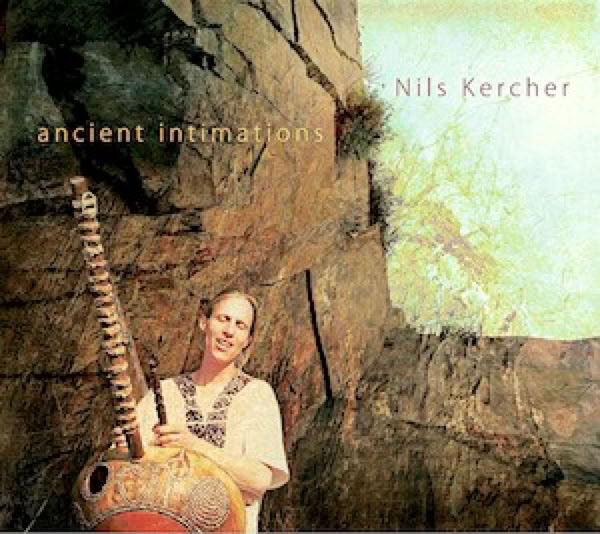
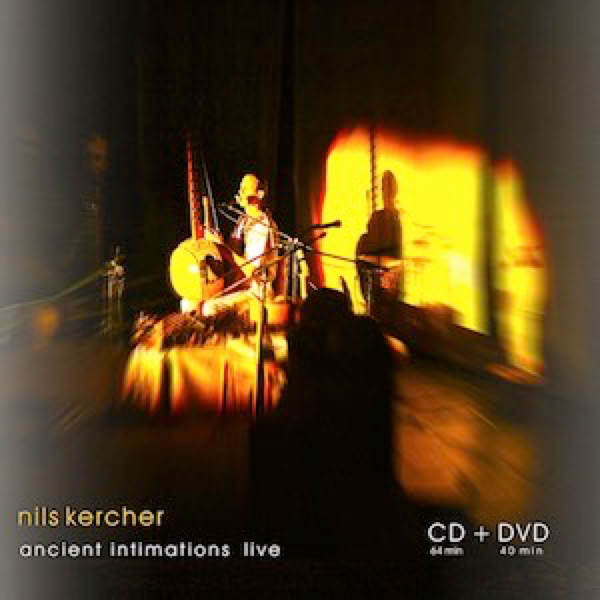
Nils Kercher Ancient Intimations LIVE (2012) box set CD + DVD
„The concert Ancient Intimations made time stand still for two hours”
General-Anzeiger Bonn
“great world music“
Rocktimes
This album captures the inspired atmosphere of Nils Kercher´s concerts. The combination of kora, earthy percussion, melodic vocals, cello and bansuri plus audience interaction features a musician who slides between different cultures to create almost pop songs from ethnical themes without ever loosing their organic natural essence.
A variety of sounds goes through this album. The listener's ears enter frequently a fresh landscape.
One trademark remains Nils´ distinct voice which sometimes soars on a high, almost Gregorianic sounding pitch, before turning into a rhythmical improvisation or a melody sung in West African Mande style. In this recording we hear it blending with Sylvia Laubé´s warm Caribbean timbre and Kira Kaipanen´s Nordic colour.
The musicians seem to create the sense of tranquility and timelessness of a remote village in the midst of modern world. Interactive compositions with the audience celebrate the fact that music is an ageold means of communication and exchange between humans in everyday life.
In this recording the polyrhythmical background of the track Miniamba is created by the audience.
The album includes new and uptempo live versions of many of the songs released on the successful studio album „Ancient Intimations“ in 2009, plus four previously unpublished songs. The 10 tracks were recorded during a concert in November 2009 in Bonn and first released in 2012.
DVD:
This album comes with a DVD including a short film that outlines some of the best moments of the concert plus three music videos.
Musicians:
Nils Kercher (Germany): kora, djembé, vocals, violin, kalimba, balafon, music & arrangment
Kira Kaipainen (Finland): percussion, bolong, balafon, dance, vocals
Samuli Teho Majamäki (Finland): percussion, udu, vocals, gong, harmonium
Sylvia Laubé (Caribbean / France): vocals, percussion, dance
Stephanie Bosch (Germany): bansuri - Indian bamboo flute
Thomas Steudel (Germany): cello







